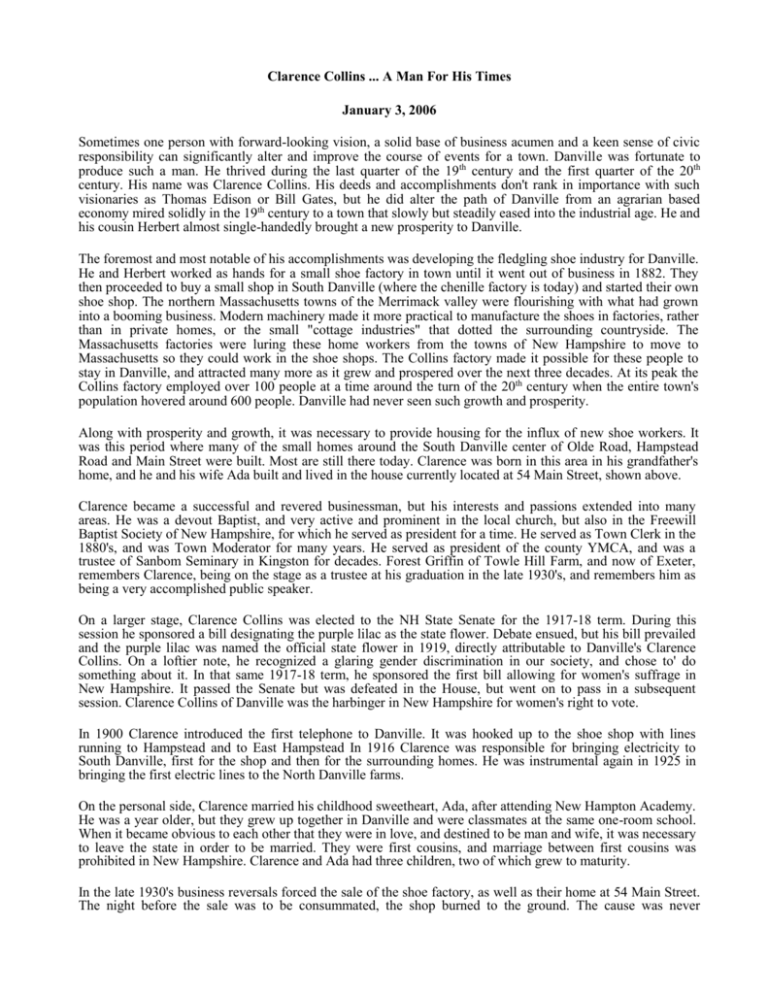Clarence Collins A Man For His Times
advertisement

Clarence Collins ... A Man For His Times January 3, 2006 Sometimes one person with forward-looking vision, a solid base of business acumen and a keen sense of civic responsibility can significantly alter and improve the course of events for a town. Danville was fortunate to produce such a man. He thrived during the last quarter of the 19th century and the first quarter of the 20th century. His name was Clarence Collins. His deeds and accomplishments don't rank in importance with such visionaries as Thomas Edison or Bill Gates, but he did alter the path of Danville from an agrarian based economy mired solidly in the 19th century to a town that slowly but steadily eased into the industrial age. He and his cousin Herbert almost single-handedly brought a new prosperity to Danville. The foremost and most notable of his accomplishments was developing the fledgling shoe industry for Danville. He and Herbert worked as hands for a small shoe factory in town until it went out of business in 1882. They then proceeded to buy a small shop in South Danville (where the chenille factory is today) and started their own shoe shop. The northern Massachusetts towns of the Merrimack valley were flourishing with what had grown into a booming business. Modern machinery made it more practical to manufacture the shoes in factories, rather than in private homes, or the small "cottage industries" that dotted the surrounding countryside. The Massachusetts factories were luring these home workers from the towns of New Hampshire to move to Massachusetts so they could work in the shoe shops. The Collins factory made it possible for these people to stay in Danville, and attracted many more as it grew and prospered over the next three decades. At its peak the Collins factory employed over 100 people at a time around the turn of the 20th century when the entire town's population hovered around 600 people. Danville had never seen such growth and prosperity. Along with prosperity and growth, it was necessary to provide housing for the influx of new shoe workers. It was this period where many of the small homes around the South Danville center of Olde Road, Hampstead Road and Main Street were built. Most are still there today. Clarence was born in this area in his grandfather's home, and he and his wife Ada built and lived in the house currently located at 54 Main Street, shown above. Clarence became a successful and revered businessman, but his interests and passions extended into many areas. He was a devout Baptist, and very active and prominent in the local church, but also in the Freewill Baptist Society of New Hampshire, for which he served as president for a time. He served as Town Clerk in the 1880's, and was Town Moderator for many years. He served as president of the county YMCA, and was a trustee of Sanbom Seminary in Kingston for decades. Forest Griffin of Towle Hill Farm, and now of Exeter, remembers Clarence, being on the stage as a trustee at his graduation in the late 1930's, and remembers him as being a very accomplished public speaker. On a larger stage, Clarence Collins was elected to the NH State Senate for the 1917-18 term. During this session he sponsored a bill designating the purple lilac as the state flower. Debate ensued, but his bill prevailed and the purple lilac was named the official state flower in 1919, directly attributable to Danville's Clarence Collins. On a loftier note, he recognized a glaring gender discrimination in our society, and chose to' do something about it. In that same 1917-18 term, he sponsored the first bill allowing for women's suffrage in New Hampshire. It passed the Senate but was defeated in the House, but went on to pass in a subsequent session. Clarence Collins of Danville was the harbinger in New Hampshire for women's right to vote. In 1900 Clarence introduced the first telephone to Danville. It was hooked up to the shoe shop with lines running to Hampstead and to East Hampstead In 1916 Clarence was responsible for bringing electricity to South Danville, first for the shop and then for the surrounding homes. He was instrumental again in 1925 in bringing the first electric lines to the North Danville farms. On the personal side, Clarence married his childhood sweetheart, Ada, after attending New Hampton Academy. He was a year older, but they grew up together in Danville and were classmates at the same one-room school. When it became obvious to each other that they were in love, and destined to be man and wife, it was necessary to leave the state in order to be married. They were first cousins, and marriage between first cousins was prohibited in New Hampshire. Clarence and Ada had three children, two of which grew to maturity. In the late 1930's business reversals forced the sale of the shoe factory, as well as their home at 54 Main Street. The night before the sale was to be consummated, the shop burned to the ground. The cause was never determined. However, despite his difficult financial situation, Clarence insisted on paying his workers beyond what could be expected at that time, even when they could do no work. Clarence and Ada then moved next door to 60 Main Street, the family homestead, and spent their remaining years living with his spinster sister, Agnes. Clarence died in 1942 at the age of 84. Ada followed him two years later. They are buried in the Center Cemetery. Joyce Davies, now of Kingston, Clarence and Ada's great granddaughter, reflects fondly on her early memories of them. They were very formal people, and she remembers them changing their clothes daily after lunch to suitable attire to receive guests. According to Joyce, there were many. Clarence had made a multitude of friends over the years through his business dealings, civic deeds, and political service. There was always a visitor. Clarence Collins could be called a "big frog in a small pond;" and he was a very big "frog" in that ''pond'' Now a century later, we are grateful that "pond" was Danville, and his curious mind, business acumen, civic good will, and outstanding character reflected so positively on our tiny community.






